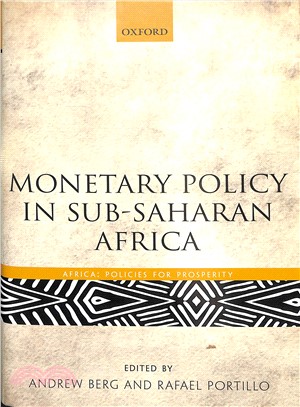Monetary Policy in Sub-saharan Africa
商品資訊
系列名:Africa: Policies for Prosperity
ISBN13:9780198785811
出版社:Oxford Univ Pr
作者:Andrew Berg (EDT); Rafael Portillo (EDT)
出版日:2018/05/22
裝訂/頁數:精裝/496頁
規格:24.1cm*16.1cm*3.2cm (高/寬/厚)
定價
:NT$ 6300 元若需訂購本書,請電洽客服 02-25006600[分機130、131]。
商品簡介
作者簡介
相關商品
商品簡介
Low-income countries in sub-Saharan Africa present unique monetary policy challenges, from the high share of volatile food in consumption to underdeveloped financial markets; however most academic and policy work on monetary policy is aimed at much richer countries. Can economic models and methods invented for rich countries even be adapted and applied here? How does and should monetary policy work in sub-Saharan African? Monetary Policy in Sub-Saharan Africa answers these questions and provides practical tools and policy guidance to respond to the complex challenges of this region.
Most countries in sub-Saharan Africa have made great progress in stabilizing inflation over the past two decades. As they have achieved a degree of basic macroeconomic stability, policymakers are looking to avoid policy misalignments and respond appropriately to shocks in order to achieve stability and growth. Officially, they often have adopted "money targeting" frameworks, a regime that has long disappeared from almost all advanced and even emerging-market discussions. In practice, though, they are in many cases finding current regimes lacking, with opaque and sometimes inconsistent objectives, inadequate transmission of policy to the economy, and difficulties in responding to supply shocks. Monetary Policy in Sub-Saharan Africa takes a new approach by applying dynamic general equilibrium models suitably adapted to reflect key features of low-income countries for the analysis of monetary policy in sub-Saharan African countries.
Using a progressive approach derived from the International Monetary Fund's extensive practice and research, Monetary Policy in Sub-Saharan Africa seeks to address what we know about the empirics of monetary transmission in low-income countries, how monetary policy can work in countries characterized by underdeveloped financial markets and opaque policy regimes, and how we can use empirical and theoretical methods largely derived in advanced countries to answer these questions. It then uses these key topics to guide policymakers as they attempt to adjust food price, terms of trade, aid shocks, and the effects of the global financial crisis.
Most countries in sub-Saharan Africa have made great progress in stabilizing inflation over the past two decades. As they have achieved a degree of basic macroeconomic stability, policymakers are looking to avoid policy misalignments and respond appropriately to shocks in order to achieve stability and growth. Officially, they often have adopted "money targeting" frameworks, a regime that has long disappeared from almost all advanced and even emerging-market discussions. In practice, though, they are in many cases finding current regimes lacking, with opaque and sometimes inconsistent objectives, inadequate transmission of policy to the economy, and difficulties in responding to supply shocks. Monetary Policy in Sub-Saharan Africa takes a new approach by applying dynamic general equilibrium models suitably adapted to reflect key features of low-income countries for the analysis of monetary policy in sub-Saharan African countries.
Using a progressive approach derived from the International Monetary Fund's extensive practice and research, Monetary Policy in Sub-Saharan Africa seeks to address what we know about the empirics of monetary transmission in low-income countries, how monetary policy can work in countries characterized by underdeveloped financial markets and opaque policy regimes, and how we can use empirical and theoretical methods largely derived in advanced countries to answer these questions. It then uses these key topics to guide policymakers as they attempt to adjust food price, terms of trade, aid shocks, and the effects of the global financial crisis.
作者簡介
Andrew Berg is Deputy Director of the IMF's Institute for Capacity Development. He first joined the IMF in 1993 and has most recently worked recently in the Research Department as chief of the development macroeconomic division. Before that, he worked in the African Department, including as chief of the regional studies division and mission chief to Malawi, and in the Department of Strategy Policy and Review. He has also worked at the U.S. Treasury and as an associate of Jeffrey Sachs. He has a Ph.D. in Economics from MIT and an undergraduate degree from Harvard. He has published articles on, among other things, growth accelerations, the macroeconomics of aid, predicting currency crises, inequality, and the implications of public investment for debt sustainability, in addition to monetary policy.
Rafael Portillo is at the IMF, where he has worked in the Western Hemisphere, Monetary and Capital Markets, African, and Research Departments. He took leave from the IMF in 2016-17 to work at the Joint Vienna Institute. His work has focused on macroeconomic modeling and monetary policy issues, through surveillance, research and technical assistance. Mr. Portillo has coauthored several IMF policy papers, working papers and academic publications. He received his PhD in Economics in 2006 from the University of Michigan and also holds degrees from the Universite Paris I (Pantheon-Sorbonne) and the Universite Paris IX (Dauphine).
主題書展
更多
主題書展
更多書展今日66折
您曾經瀏覽過的商品
購物須知
外文書商品之書封,為出版社提供之樣本。實際出貨商品,以出版社所提供之現有版本為主。部份書籍,因出版社供應狀況特殊,匯率將依實際狀況做調整。
無庫存之商品,在您完成訂單程序之後,將以空運的方式為你下單調貨。為了縮短等待的時間,建議您將外文書與其他商品分開下單,以獲得最快的取貨速度,平均調貨時間為1~2個月。
為了保護您的權益,「三民網路書店」提供會員七日商品鑑賞期(收到商品為起始日)。
若要辦理退貨,請在商品鑑賞期內寄回,且商品必須是全新狀態與完整包裝(商品、附件、發票、隨貨贈品等)否則恕不接受退貨。
























